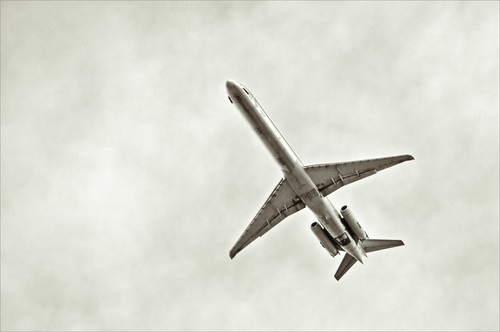Martin Broughton, the chairman of British Airways, has had it up to here with the horse-and-pony show of airport security requirements required for all European flights headed to the United States.
“America does not do internally a lot of the things they demand that we do,” Broughton said in comments quoted by the Financial Times and confirmed by British Airways.
“We shouldn’t stand for that. We should say, ‘We’ll only do things which we consider to be essential and that you Americans also consider essential.'”
Specifically, he was referring to shoe and laptop removal requirements — “redundant” practices he had a few other choice phrases for.
Chairman Martin Broughton accused the U.S. of demanding “completely redundant” security checks at airports, such as removing shoes and separate examinations of laptop computers.
Europe should not have to “kowtow to the Americans every time they want something done” to beef up security on U.S.-bound flights, Broughton said.
He won support Wednesday from the owner of Heathrow airport and the British pilots’ union as well as several European airlines and security experts on both sides of the Atlantic.
It isn’t just European pilots who are on his side. Many of the major carriers across the pond gave their seals of approval to Broughton’s frustration.
security experts and several European airlines, including Virgin Atlantic, Iberia and Finnair, welcomed Broughton’s comments, saying it was time to reevaluate the many layers of time-consuming airport security.
“We need to keep passengers safe, but there’s also a whole bunch of security rules that could be eased out,” said Chris Yates, an aviation security analyst in London.
The requirement to remove shoes for screening, for example, was “the knee-jerk reaction after Richard Reid.” The newest metal detectors would sense any metal such as wiring in shoes, he contended.
Many of the security rules are in place because of history rather than real risk, agreed Todd Curtis, a Seattle-based security expert at airsafe.com.
As with all risk management decisions — and, at its core, that’s what all security comes down to — Curtis’ point is the issue at hand: how do you ensure that commercial airlines can be as safe as possible but at the same time not impose onerous safeguards that impair their ability to succeed as commercial ventures?
The safest way to make sure no planes explode would be to ban air travel. No planes would ever be hijacked again. Also, oh yeah, no one would ever make another dime in the airline industry and we would all be doing a lot more driving.
The other extreme would be to have no security at all. There would be no lines to wait in before you board. No privacy-invading x-ray screening. The whole process of flying would be streamlined and the airport would become an ideal environment to make money from consumers. But then planes would likely be dropping out of the sky every few weeks.
There needs to be a balance.
And with a sensitive, hot-button issue like airport security — which is essentially the lynchpin of America’s “domestic war on terror” — the pendulum between safety and convenience will likely always sway along with the news. The more terrorist plots we see, particularly if ever there is another, major successful event, the more security we will likely see. The fewer events we hear about, the more complacency will set in and the more people will covet convenience.
Apparently some European heads of industry think the pendulum has swung too far in direction of safety — or more accurately, they think the “for-show” protocols that were once mere annoyances have turned into business-harming problems that need to be fixed.
Time can do that.
In related news, a humorous new website called Fun With TSA that I bet Broughton would enjoy is poking fun at some proposed, in-flight TSA safety restrictions. Apparently the aviation watchdog has suggested that it may be wise to not allow passengers to “leave your seat during the last hour of your flight, use electronic devices, or have anything at all on your lap.”
And while that would indeed be very annoying, here are two of their suggestions on fun ways you can pass the time during the last hour. There are eight other ideas if you click through to the Fun With TSA site.

Be the person on your flight to suddenly shout out “Marco!” during that last hour when others are looking for things to do. It might take a few tries, but eventually someone somewhere on the plane will respond with a “Polo!” if for no other reason than to shut you up. Entertainment achieved.

This can be every bit as much fun as when people do “the wave” at a stadium, only there will be no standing up here for obvious reasons. Instead, simply power on your overhead light, wait for the people in front of you to power on theirs, then turn yours off. A truly beautiful spectacle once it gets going.


